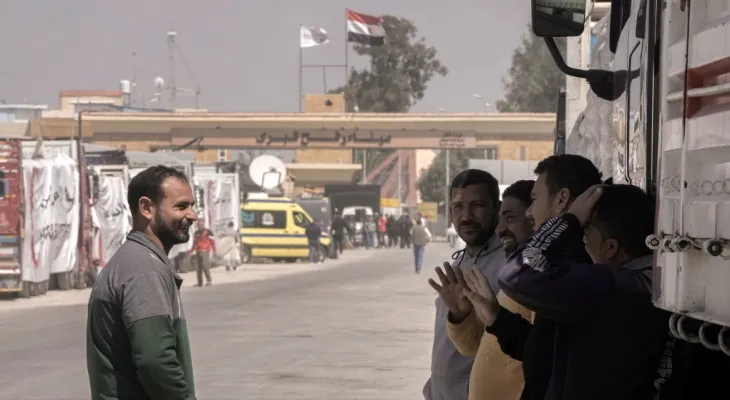Search here
Newspaper
Search here

Arab Canada News
News

Published: March 29, 2024
The United Nations Supreme Court on Thursday ordered Israel to take measures to improve the humanitarian situation in Gaza, including opening more land crossings to allow the entry of food, water, fuel, and other supplies into the war-torn sector.
The International Court of Justice issued the so-called two new provisional measures in a case filed by South Africa accusing Israel of committing genocide in its military campaign launched after the October 7 attacks carried out by Hamas. Israel denies committing genocide and accused South Africa of attempting to "undermine Israel’s inherent right and commitment to defend its citizens.
Thursday’s order came after South Africa sought further provisional measures, including a ceasefire, citing famine in Gaza. Israel, which urged the court not to issue new orders, said it places no restrictions on aid entering Gaza and pledged to "enhance new initiatives" to bring more assistance.
In its legally binding order, the court asked Israel to take action "without delay" to ensure "the provision of essential services and humanitarian aid without obstacles, including food, water, fuel, and medical supplies."
It also ordered Israel to immediately ensure that its army will not take any action that could harm the rights of Palestinians under the Genocide Convention, including by preventing the delivery of humanitarian aid.
The court requested Israel to submit a report within a month on the implementation of the orders.
Israel declared war in response to the attack launched by Hamas across the border on October 7, which resulted in the death of 1,200 people and the capture of 250 others as hostages. Israel responded with a campaign of airstrikes and a ground attack that left more than 32,000 Palestinian dead, according to local health authorities.
The Ministry of Health in Gaza, run by Hamas, does not distinguish between civilians and fighters, but it says that about two-thirds of those killed are women, children, and teenagers. Israel says more than one-third of the dead are militants, although it has not provided evidence to support this claim, blaming Hamas for civilian casualties because the group operates in residential areas.
The fighting has displaced more than 80% of Gaza’s population, caused widespread damage, and led to a humanitarian crisis. The United Nations and international relief agencies say almost all Gaza residents struggle to get enough food, with hundreds of thousands on the brink of starvation, especially in heavily damaged northern Gaza.
South Africa welcomed Thursday’s decision and described it as "important."
The South African president said in a statement, "The fact that Palestinian deaths result not only from shelling and ground attacks, but also from disease and famine, indicates the need to protect the collective right to existence."
Hamas, an Islamist militant movement committed to the destruction of Israel, said this ruling must be implemented by the international community.
It added: "It must be implemented immediately, so this decision does not remain a mere ink on paper."
The Palestinian Ministry of Foreign Affairs thanked South Africa and described the case as "a vital step in global efforts to hold Israel accountable for committing genocide."
After initially closing Gaza’s borders in the early days of the war, Israel began allowing humanitarian supplies in. It says it places no restrictions on the amount of humanitarian aid permitted to enter Gaza and accuses the United Nations of failing to properly organize deliveries. The army said on Tuesday it inspected 258 aid trucks, but only 116 trucks were distributed inside Gaza by the United Nations.
The United Nations and international relief organizations say deliveries have been hindered by Israeli military restrictions, ongoing hostilities, and the breakdown of public order.
The Israeli Ministry of Foreign Affairs accused South Africa of "mocking attempts" to exploit the international court to undermine Israel’s right to self-defense and the release of remaining hostages. Israel says Hamas continues to hold about 100 hostages and the remains of 30 others who were either killed on October 7 or died in captivity.
It added, "Israel will continue to enhance new initiatives, expand existing initiatives, to enable and facilitate the flow of aid to the Gaza Strip... despite operational challenges on the ground and Hamas’s active and malicious efforts to seize and store and steal aid."
Israel is working with international partners on a plan to soon begin delivering aid by sea.
Israel has had repeated conflicts with the United Nations, especially UNRWA, the United Nations agency for Palestinian refugees and the main provider of aid in Gaza. Israel accuses the agency of tolerating and even cooperating with Hamas, which UNRWA denies.
The court said in its order that "Palestinians in Gaza are no longer only facing the risk of famine... but this famine has started to loom." It cited a report from the United Nations Office for the Coordination of Humanitarian Affairs which said at least 31 people, including 27 children, have already died due to malnutrition and dehydration.
The International Court said the previous orders imposed on Israel after historic hearings in the South Africa case "do not fully address the consequences arising from changes in the situation" in Gaza.
The Government Coordination Secretariat in the Territories, the Israeli military body responsible for Palestinian civil affairs, has implemented pilot programs to inspect humanitarian aid at major checkpoints in southern Israel and then use land crossings in central Gaza to try to deliver aid to the devastated northern part of the strip. The agency had no immediate comment on the International Court of Justice ruling.
Comments